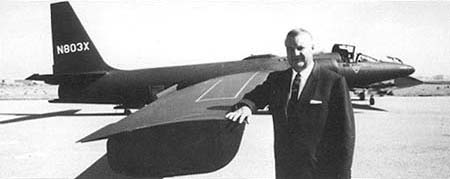
I’m doing research on high-performance teams that can evolve how they work to changing environments. I see it in the best designers, agile programmers, engineers and others. And I’m not too surprised to see it in Skunk Works, a book about the famous Lockheed Advanced Development Projects group. The man who ran the group during the early years — Kelly Johnson (shown with the U-2 spy plane) — wrote up a set of rules that emphasize small teams, close collaboration, low ceremony, iteration and testing, relationships built on trust, and constant communication…
- The Skunk Works’ program manager must be delegated practically complete control of his program in all aspects. He should report to a division president or higher.
- Strong but small project offices must be provided both by the military and industry.
- The number of people having any connection with the project must be restricted in an almost vicious manner. Use a small number of good people.
- Very simple drawing and drawing release system with great flexibility for making changes must be provided in order to make schedule recovery in the face of failures.
- There must be a minimum number of reports required, but important work must be recorded thoroughly.
- There must be a monthly cost review covering not only what has been spent and committed but also projected costs to the conclusion of the program. Don’t have the books ninety days late and don’t surprise the customer with sudden overruns.
- The contractor must be delegated and must assume more than normal responsibility to get good vendor bids for subcontract on the project. Commercial bid procedures are very often better than military ones.
- The inspection system as currently used by the Skunk Works, which has been approved by both the Air Force and the Navy, meets the intent of existing military requirements and should be used on new projects. Push basic inspection responsibility back to the subcontractors and vendors. Don’t duplicate so much inspection.
- The contractor must be delegated the authority to test his final product in flight. He can and must test it in the initial stages. If he doesn’t, he rapidly loses his competency to design other vehicles.
- The specification applying to the hardware must be agreed to in advance of contracting. The Skunk Works practice of having a specification section stating clearly which important military specification items will not knowingly be complied with and reasons therefore is highly recommended.
- Funding a program must be timely so that the contractor doesn’t have to keep running to the bank to support government projects.
- There must be absolute mutual trust between the military organization and the contractor with very close liaison on a day-to-day basis. This cuts down misunderstanding and correspondence to an absolute minimum.
- Access by outsiders to the project and its personnel must be strictly controlled.
- Because only a few people will be used in engineering and most other areas, ways must be provided to reward good performance by pay, not simply related to the number of personnel supervised.
- Starve before doing business with the damned Navy. They don’t know what in hell they want and will drive you up a wall before they break either your heart or a more exposed part of your anatomy.
And a last rule passed on through oral tradition…
Comments
One response to “Kelly Johnson’s Rules for Skunk Works”
Does anyone think there is a need to change those rules in the years since the heyday of Kelly Johnson?